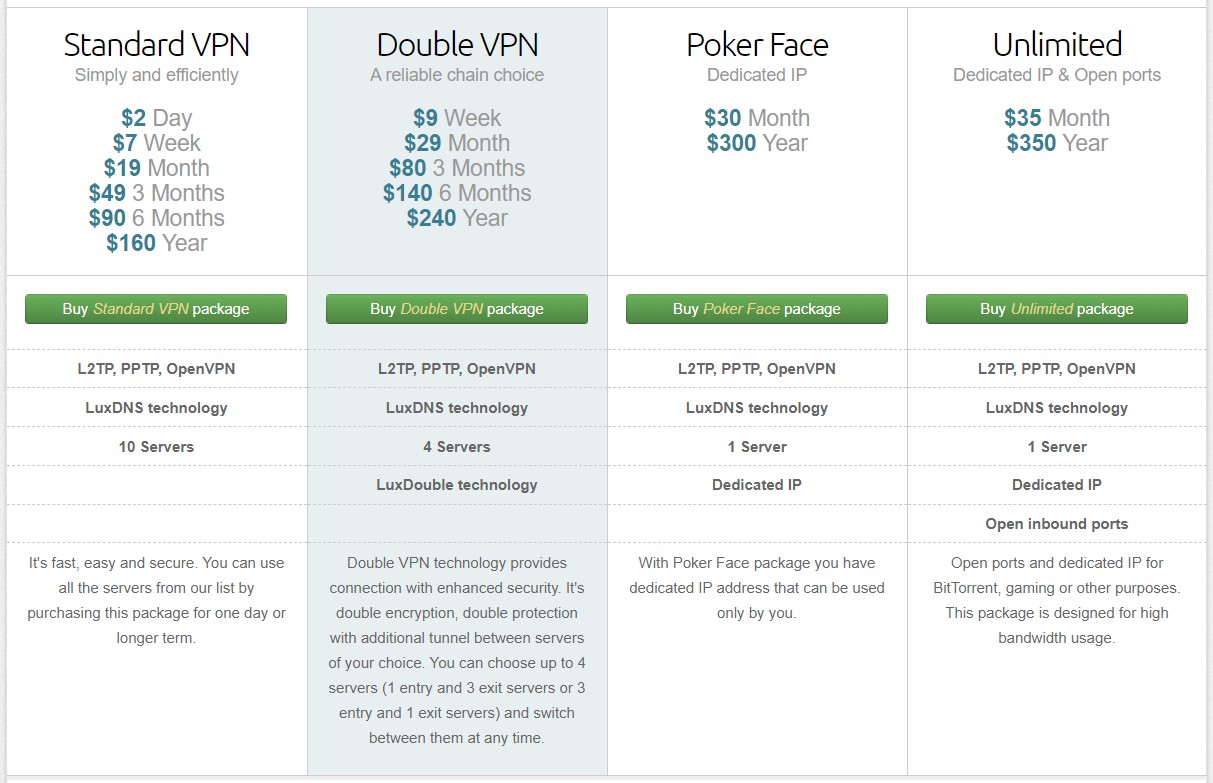TechRadar Verdict
VPNLUX is an expensive VPN service, but offers excellent download speeds and superior privacy protection mechanisms, allowing users to choose between subscriptions that range from a regular VPN to an expert-level option with a dedicated IP and open ports. However, this is where its advantages end and problems begin. The service collects certain logs, doesn’t unblock geo-restricted content, the range of servers is limited, there’s no free trial, and there aren’t any native clients.
Pros
- +
Superb speeds
- +
Plenty of subscription options
- +
Supports torrenting
- +
Accepts Bitcoin
Cons
- -
Very expensive
- -
Some logging
- -
Doesn’t unblock BBC iPlayer or Netflix
- -
No native apps
- -
Limited server infrastructure
- -
Not much help on the website
- -
No free trial
Why you can trust TechRadar
VPNLUX is a VPN service geared towards experienced users who prioritize performance and won't be phased by the lack of beginner-friendly native clients.
It focuses on superior speeds and top-notch privacy, which is reflected in its price. However, we found the service underperforms in other key areas.
Price
VPNLUX offers multiple subscription options: Standard VPN, Double VPN, Poker Face, and Unlimited. Regardless of the chosen plan, you can run up to 2 simultaneous VPN connections.
Standard VPN is the entry-level option, available for purchase for the duration of between one day and one year. One day of the service costs $2, while the yearly plan carries a price tag of $160 (or $13.33/month), which is far from cheap.
Double VPN includes enhanced security thanks to its double encryption and an optional additional VPN tunnel of your choice. The Poker Face package will get you a dedicated IP address that can only be used by you. Finally, the Unlimited plan adds open inbound ports for BitTorrent, gaming, or other purposes, and is designed for high bandwidth usage.
Interestingly, the Standard VPN provides access to ten servers, while the Double VPN provides access to only four. The remaining two options reduce the number even further - to only one.
Unfortunately, there’s no free trial, but if you just want to try out the Standard VPN service as painlessly as possible, you can purchase the one-day account. Do note that the provider requires you to pay at least $5, though, so it’s not that cheap. The shortest possible duration for the Double VPN is one week at $9, while the Poker Face and Unlimited options can only be purchased as monthly and yearly subscriptions.
If the service isn’t working for you for at least 7 days, you may be eligible for a refund.
Accepted payment methods include PayPal, credit/debit cards, Perfect Money, WebMoney, Yandex, and Bitcoin. All the packages can be frozen for up to 15 days.

Alternatives
VPNLUX may yet reach the heights of ExpressVPN, NordVPN, Surfshark, or CyberGhost, but there is currently plenty of room for improvement.
It is more expensive than all of them, yet it doesn’t offer any native clients, thousands of servers all over the world, free trials nor generous money-back guarantees. Neither can it unblock geo-restricted content and its no-logging policies have not been examined by an independent auditor.
If your requirements don’t go beyond the standard VPN features, we recommend one of the listed competitors as a more suitable alternative.
Streaming
Despite what the website suggests, this provider can’t unblock the localized British content on BBC iPlayer, at least it couldn’t at the time of our testing. The same goes for Netflix, as we still couldn’t see the titles specific to the US when we connected to the server in that location.
About the company
The company running this VPN is called Network Tech Investments Inc. and is registered in Belize, outside of the jurisdiction of any governments renowned for surveillance.
However, it only has 10 server locations in 8 countries: Germany, France, Luxembourg, the Netherlands, the UK, the US, Canada, and Russia. The provider has also told us it has more than 400 IP addresses.
Privacy and encryption
All the packages allow you to choose between L2TP/IPSec, PPTP, and OpenVPN transfer protocols. The PPTP protocol runs on the MPPE 128-bit encryption, L2TP/IPsec on 3DES 168-bit and AES 256-bit, while OpenVPN runs on RSA 2048-bit and AES 256-bit encryption.
The Double VPN package deploys the LuxDouble technology (the provider states this is better than the usual port forwarding as it’s “based on real server-to-server tunneling”). All the packages include the LuxDNS technology - allowing you to use the provider’s own DNS server, protecting you from DNS spoofing, and providing reliable security for various online activities like banking and shopping.
Sharing large files via torrenting and P2P clients is permitted.
We examined the provider’s Privacy Policy to check its logging practices. There we learned that, while it claims to not store logs (i.e. “visited resources and other network activity of users”), it also says that it collects user ID number (assigned upon registration), user package ID number, session start time, session end time, and bandwidth usage (in MBs).
While this may not be enough for anyone to identify specific users, we can’t be sure if this really is the only information being collected, as there hasn’t yet been an independent audit of the platform.
Support
VPNLUX has no apps of its own but it can be set up via on-device VPN settings or third-party software on Windows, Mac, and iOS. We discovered that Android is supported as well, although there are still no instructions for it. The provider also supports OpenVPN installation on routers with DDWRT and OpenWRT firmware, as well as on Linux through configs.
The instructions for manual installation can be found in the help section, along with answers to frequently asked questions. Since the help section is very narrow, you may try your luck with an email, Twitter, or the feedback form. We tested the form option and got a pretty detailed response.
Speed and experience
Due to not having any native clients, VPNLUX is slightly complicated to set up, but at least you don’t have to type in your credentials when you’re connecting to each server for the first time, as is the case with most similar VPN services.
We tested the provider’s download speeds from a 61.16Mbps testing connection and a physical location in Southeast Europe. The server in Germany did wonderfully, at least on the OpenVPN UDP protocol, delivering 51.73Mbps.
Then we moved a bit further north, to the UK, and the results were lower but still very good: 20.38Mbps.
A server in the US gave us 15.83Mbps, once again a very good result considering our location and testing connection. Finally, we tried a server in Russia, which gave us another fine result at 18.32Mbps.
Verdict
VPNLUX offers flexible subscription options and will give you great speeds from all of its servers. But ultimately, the packages are too expensive, especially for a VPN that hasn’t yet organized an independent audit, can’t unblock Netflix or BBC iPlayer, has no native apps, and only a handful of servers.
Sead is a seasoned freelance journalist based in Sarajevo, Bosnia and Herzegovina. He writes about IT (cloud, IoT, 5G, VPN) and cybersecurity (ransomware, data breaches, laws and regulations). In his career, spanning more than a decade, he’s written for numerous media outlets, including Al Jazeera Balkans. He’s also held several modules on content writing for Represent Communications.
